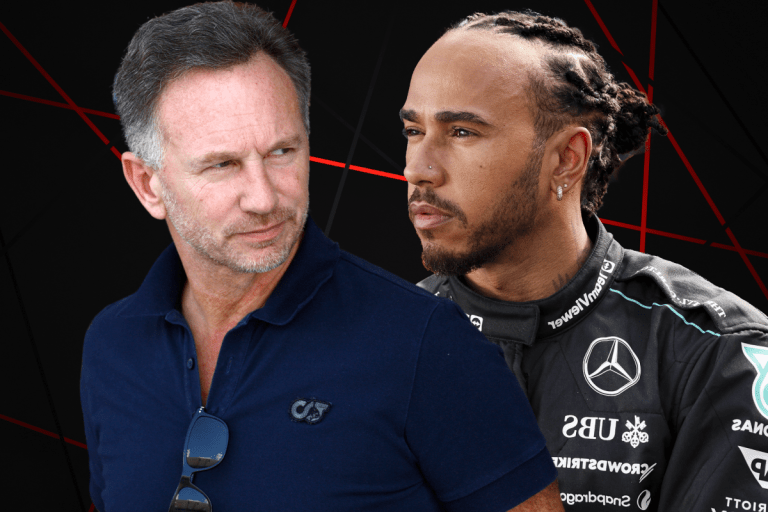Update:Christian Horner Calls Hamilton Relationship ‘Stale’ Following…read more

Christian Horner Calls Hamilton Relationship ‘Stale’ Following…read more
Christian Horner, the outspoken team principal of Red Bull Racing, has sparked a major stir in the Formula 1 world with his recent comments about his relationship with Mercedes star Lewis Hamilton. Describing their professional dynamic as “stale,” Horner provided a candid insight into the evolving, and apparently cooling, relationship between two of F1’s most influential figures.
Historically, Horner and Hamilton shared a connection based on mutual respect, even though they came from different ends of the F1 spectrum. Horner, who has played a pivotal role in Red Bull Racing’s rise to prominence, and Hamilton, one of the sport’s most successful and decorated drivers, initially maintained a competitive but collegial rapport. They occasionally found common ground in their shared pursuit of excellence in the sport, although they operated from rival teams. However, Horner’s recent use of the term “stale” suggests that their once vibrant relationship has grown stagnant, hinting at a growing tension that may have been building for some time.
This shift is especially significant given the broader context of Formula 1’s current power structure. Under Horner’s leadership, Red Bull Racing has been enjoying a dominant phase, with Max Verstappen’s incredible rise to dominance solidifying the team’s position as the one to beat in F1. This success has led to increasing rivalry with Mercedes, where Hamilton remains the cornerstone of their efforts to remain competitive. While Hamilton’s driving talent is still undeniable, Mercedes’ struggle to match Red Bull’s pace has been well-documented, and the frustration within the Mercedes camp is palpable.
Horner’s decision to publicly label his relationship with Hamilton as “stale” is likely a reflection of these growing tensions. As Red Bull continues to extend its dominance, the competitive landscape of F1 has shifted dramatically. Mercedes, once the dominant force in F1, now finds itself chasing the success of Red Bull, which has created strain not only within teams but between their key figures. Hamilton, accustomed to being at the top of the sport, now finds himself in a position of uncertainty as Mercedes grapples with performance challenges. Meanwhile, Horner, an expert in navigating F1’s political and technical challenges, leads a team with a growing sense of invincibility, thanks in large part to Verstappen’s extraordinary run of form.
The term “stale” in this context carries significant weight. It implies that the relationship between Horner and Hamilton, once built on shared respect, has become static, failing to evolve with the changes in the sport. Although Horner did not provide specific details on why their rapport has deteriorated, the competitive pressures surrounding their respective teams are likely a key factor. The nature of F1 as a high-stakes environment, where allegiances and strategies constantly shift, may have contributed to this growing divide.
The broader political landscape within F1, with rivalries intensifying both on and off the track, is another layer of complexity to consider. Horner’s Red Bull team, with Verstappen leading the charge, is firmly at the top, and the pressure on Mercedes to respond is only increasing. While Hamilton is still a formidable force, his future at Mercedes remains uncertain, with speculation swirling about how long he will stay with the team if they continue to fall short of Red Bull’s dominance.
The comments from Horner also shine a light on the shifting nature of F1 rivalries, which are rarely confined to what happens on the track. As Verstappen’s dominance grows, so does the intensity of Red Bull’s competitors, with Mercedes and Hamilton bearing the brunt of that pressure. The once collegial dynamic between Horner and Hamilton now appears to be a thing of the past, replaced by the stark reality of fierce competition and differing team priorities.
As the season progresses, the F1 community will be watching closely to see how this public acknowledgment of a “stale” relationship impacts the dynamics between Red Bull Racing and Mercedes. Will this mark a turning point in the ongoing rivalry, or could it signal the beginning of a new chapter in F1’s intense power struggle? Only time will tell, but for now, the tension between Horner and Hamilton stands as a symbol of the changing nature of Formula 1’s competitive landscape. The question remains: will Mercedes be able to rise to the challenge, or will Red Bull’s dominance continue to shape the future of the sport?






